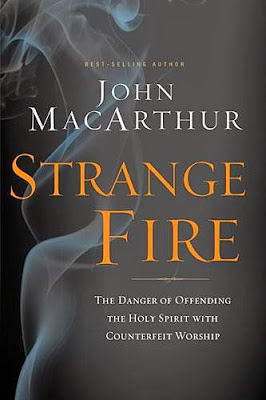If you plan on purchasing Strange Fire, consider supporting Grace for Sinners by purchasing from Amazon.
Author: John MacArthur
Publisher: Thomas Nelson
Reading Level: Easy
Right off the bat: I was surprised with how much I agreed with MacArthur. Also, if people would have read the book in addition to listening to the conference messages there would have been a lot less confusion. For instance, John MacArthur states:
I want to emphasize, from the outset, that I regard fellow workmen in Christ and friends in ministry all who are faithful fellow workmen in the Word and the gospel, even if they give a place of legitimacy to the charasmatic experience. I have good friends among them who label themselves as “reformed charismatic” or “evangelical continuationist.” (p. 231)So he’s not broad-brush condemning all charismatics for the blasphemy of the Holy Spirit. MacArthur does critique continuationists (especially for it lending academic credence to charismatic abuses with Grudem’s fallible prophecy interpretation), but saves his strongest indictment for mainstream Pentecostalism and charismatics. I want to share what big picture agreements and concerns I have in Strange Fire.
First, MacArthur spends a lot of time demonstrating the moral failures and heterodox practices of pentecostal and charismatic leaders (“The tragic irony is that the movement labeling itself as ‘Spirit-filled’ is notorious for sexual immorality, financial impropriety, and ostentatious worldliness in the lives of its most visible leaders.” p. 205). I’d say almost of half of the book is spent documenting these abuses. This isn’t done flippantly either. It’s thoroughly documented (almost one hundred pages of end notes). Some might protest he’s using extremes examples, but as MacArthur points out, these extremes are the face of the movement (if you critique New Calvinism you inevitably do so by engaging with John Piper, Tim Keller, DA Carson, Mark Driscoll, Matt Chandler--these are the figureheads of the movement like it or not). People like Benny Hinn, the Kansas City Prophets, and the other leaders mentioned are mainstream, popular, and widely followed.
Not all who believe God speaks to them make prophetic pronouncements as outlandish as those broadcast by charasmatic televangelists or the Kansas City Prophets. But they still believe God gives them extrabiblical messages--either through an audible voice, a vision, in their heads, or simply an internal impression. In most cases, their “prophecies” are comparatively trivial. But the difference between them and Benny Hinn’s predictions is a difference of scale, not substance. (p. 114)Also, it was interesting to find that almost all of MacArthur’s strongest critiques were echoed in some ways by charismatic sources. For instance, he cites J. Lee Grady, Charisma magazine editor, saying,
God help us! We have turned the holy fire of God into a circus sideshow--and naive Christians are buying this without realizing that such shenanigans are actually blasphemous. (p. 203)Second, MacArthur spends time describing the Biblical work of the Spirit. He talks salvation, sanctification, and Scripture. These are a helpful contrast to the wild practices described in earlier chapters. So in the end it’s not just a critique. It’s a positive engagement.
Third, MacArthur doesn’t address the presuppositions of the cessationists position. I was hoping for some foundation building. He briefly mentions the sign gifts use as necessary for building the early church. He briefly addresses 1 Corinthians 13:8-12 saying,
Significantly, though these scholars disagree on the identification of the “perfect,” [love, canon of Scripture, mature church, return of Christ, entrance into glory] they all reach the same conclusion--namely, that the miraculous and revelatory gifts have ceased.But if the interpretation is entrance into the Lord’s presence than Paul is giving a specific time frame for the cessation of the gifts. This passage in my opinion is one of the difficulties in a strict cessationist position. From biblical comparison what we see today doesn’t match what we see in Scripture as the gifts, but neither does Paul strictly speaking give us the neat and tidy cessationist position either. That leads me to one critique of the book and some of the murmur around the conference. I’ve heard MacArthur and other cessationists argue against charismatics experientially. It goes something like, “I’ve never seen the gifts being used so they must have ceased.” That’s just as bad as saying, “I talked in gibberish once so the gifts must be ongoing.” This is a debate that must be rooted firmly in the sufficient witness of the Scriptures.
Nonetheless, of the possible interpretations, the believer’s entrance into the Lord’s presence best fits Paul’s use of “perfect” in 1 Corinthians 13:10” (pp. 148-49)
Another wrinkle that must be solved in the exegetical octagon is: God clearly teaches his Scripture is sufficient for godly living and good doctrine. Those Scriptures spoken of although future applicable to the New Testament were clearly a reference to the Old Testament in context as much of the New Testament wasn’t written or compiled at Paul’s writing of 2 Timothy 3, as example. So I don’t think it’s as easy as saying that if miraculous gifts and revelatory gifts are ongoing Scripture cannot be sufficient. Did it only become sufficient after the canon closed? Is that what Scripture teaches? I’d love to hear someone like MacArthur and Carson have a tough, public conversation to nuance some of these things out.
Overall, Strange Fire is a necessary correction to the abuses in the charismatic movement. I’m not sure we can swipe the abuses under the rug as minority practice after seeing MacArthur’s research and history of the movement. MacArthur has some very real, practical, and pastoral concerns. These shouldn’t be minimized or overshadow with faux outrage that someone would dare point them out.
Disclosure of Material Connection: I received this book free from the publisher. I was not required to write a positive review. The opinions I have expressed are my own. I am disclosing this in accordance with the Federal Trade Commission’s 16 CFR, Part 255: “Guides Concerning the Use of Endorsements and Testimonials in Advertising.”




No comments:
Post a Comment